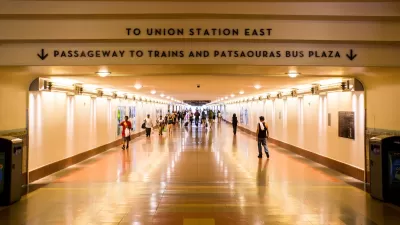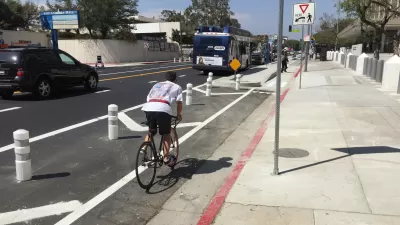A partnership between Waze and the city of Los Angeles has prompted a cry of "not on the street in front of my frontyard!" from residential neighborhoods around the city.
"The Waze traffic-avoidance app has begun sharing drivers' aggregated data with Los Angeles city and county traffic managers in exchange for information on street closures, detours and other data that make the app more useful," reports Sharon McNary.
McNary's coverage includes more details about the potential benefit of the deal to both of the parties involved. Los Angeles entered the agreement in October and announced during Mayor Eric Garcetti's State of the City Address in April.
Though Los Angeles is only one of ten cities to enter into the agreement, the unique relationship of the city's residents to their cars and the streets upon which they travel and park their cars, has prompted a strong response on the part of "Traffic NIMBYs" concerned about the number of drivers who use the app to more frequently access residential streets away from congested arterials and freeways. City Councilmember Paul Krekorian has even introduced legislation that would "reduce the impact of cut-through traffic that results from use of Waze and similar traffic apps," according to a separate article by Bianca Barragan.
Brian K. Roberts, author of L.A. Shortcuts: The Guidebook for Drivers Who Hate to Wait, written 25 years ago, pens an op-ed for the Los Angeles Times in response to pushback against Traffic NIMBYs, offering perspective about the clashing dynamics of public and private brought about by the controversy.
Roberts recalls being let off with a warning after making a turn that was once legal—before residents lobbied for changes to the street configuration in reaction to his book:
"Though I dodged a ticket, that traffic stop raised serious questions. How was it possible that a public street maintained with my tax dollars was no longer available to me? I wasn't speeding. I wasn't intoxicated. I had a valid license. It wasn't my fault that homeowners didn't look at a simple map or check the traffic patterns before they bought a house. Who were these people who had persuaded the government to give their private interests priority? What shortcut did they take every morning to get to work on time?"
One more of the best quotes from an op-ed full of provocative turns of phrase:
"Krekorian and other Waze critics — like the Brentwood woman who told the Associated Press recently that "the streets on the Westside are no longer a secret for locals, and people are angry" — should realize that the streets were never a secret meant for a select few and have been listed on maps at least since Wyatt Earp died here in 1929. Instead of blaming Waze, they should redirect their sense of entitlement to demand better mass-transit options that would reduce traffic for everyone."
FULL STORY: Will traffic NIMBYs ruin Waze?

Maui's Vacation Rental Debate Turns Ugly
Verbal attacks, misinformation campaigns and fistfights plague a high-stakes debate to convert thousands of vacation rentals into long-term housing.

Planetizen Federal Action Tracker
A weekly monitor of how Trump’s orders and actions are impacting planners and planning in America.

In Urban Planning, AI Prompting Could be the New Design Thinking
Creativity has long been key to great urban design. What if we see AI as our new creative partner?

King County Supportive Housing Program Offers Hope for Unhoused Residents
The county is taking a ‘Housing First’ approach that prioritizes getting people into housing, then offering wraparound supportive services.

Researchers Use AI to Get Clearer Picture of US Housing
Analysts are using artificial intelligence to supercharge their research by allowing them to comb through data faster. Though these AI tools can be error prone, they save time and housing researchers are optimistic about the future.

Making Shared Micromobility More Inclusive
Cities and shared mobility system operators can do more to include people with disabilities in planning and operations, per a new report.
Urban Design for Planners 1: Software Tools
This six-course series explores essential urban design concepts using open source software and equips planners with the tools they need to participate fully in the urban design process.
Planning for Universal Design
Learn the tools for implementing Universal Design in planning regulations.
planning NEXT
Appalachian Highlands Housing Partners
Mpact (founded as Rail~Volution)
City of Camden Redevelopment Agency
City of Astoria
City of Portland
City of Laramie





























